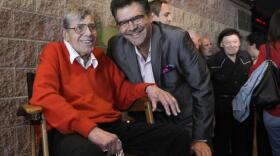-
As the short film “Dear George” begins, the main character is dressed in a chicken costume trying to get through the security gate at the Reno-Tahoe…
-
John Katsilometes of the Las Vegas Review-Journal stopped by our studios to talk about Jerry Lewis.Lewis is very much an active entertainer at the age of…
© All Rights Reserved 2026 | Privacy Policy
Tax ID / EIN: 23-7441306
Tax ID / EIN: 23-7441306

Play Live Radio
Next Up:
0:00
0:00
Available On Air Stations
Supported by


